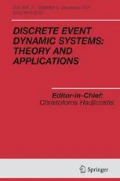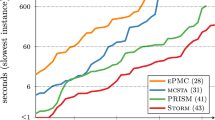Abstract
This paper is about state estimation in a timed probabilistic setting. The main contribution is a general procedure to design an observer for computing the probabilities of the states for labeled continuous time Markov models as functions of time, based on a sequence of observations and their associated time stamps that have been collected thus far. Two notions of state consistency with respect to such a timed observation sequence are introduced and related necessary and sufficient conditions are derived. The method is then applied to the detection of cyber-attacks. The plant and the possible attacks are described in terms of a labeled continuous time Markov model that includes both observable and unobservable events, and where each attack corresponds to a particular subset of states. Consequently, attack detection is reformulated as a state estimation problem.










Similar content being viewed by others
Change history
20 June 2022
A Correction to this paper has been published: https://doi.org/10.1007/s10626-022-00364-6
References
Alur R, Dill DL (1994) A theory of timed automata. Theor Comput Sci 126:183–235
Aspvall B, Plass MF, Tarjan RE (1979) A linear-time algorithm for testing the truth of certain quantified Boolean formulas. Inf Process Lett 8(3):121–123
Cardenas AA, Amin S, Sastry S (2008) Secure control: Towards survivable cyber-physical systems. In: Proc. IEEE int. conf. on distributed computing systems, China, pp 495–500
Carvalho LK, Wu Y.-C., Kwong R, Lafortune S (2018) Detection and mitigation of classes of attacks in supervisory control systems. Automatica 97:121–133
Cassandras CG, Lafortune S (2008) Introduction to discrete event systems. Springer, New York
Ding D, Han QL, Xiang Y, Ge X, Zhang XM (2018) A survey on security control and attack detection for industrial cyber-physical systems. Neurocomputing 275:1674–1683
Gagniuc PA (2017) Markov chains: From theory to implementation and experimentation. Wiley, USA
Gao C, Seatzu C, Li Z, Giua A (2019) Multiple attacks detection on discrete event systems. In: Proc. IEEE-SMC, Italy, pp 2352–2357
Gao C, Lefebvre D, Seatzu C, Li Z, Giua A (2020) A region-based approach for state estimation of timed automata under no event observation. In: Proc. IEEE 25th annual conference on emerging technologies and factory automation, Austria, pp 799–804
Meira-Góes R, Kang E, Kwong R, Lafortune S (2017) Stealthy deception attacks for cyber-physical systems. In: Proc. IEEE 56th conference on decision and control, Australia, pp 4224–4230
Hadjicostis CN, Seatzu C (2016) K-detectability in discrete event systems. In: Proc. IEEE 55th conference on decision and control, Las Vegas, pp 420–425
Hadjicostis CN (2020) Estimation and inference in discrete event systems: A model-based approach with finite automata. Springer Nature, New York
Hubballi N, Biswas S, Roopa S, Ratti R, Nandi S (2011) LAN attack detection using discrete event systems. ISA Trans 50:119–130
Karlin S, Taylor HE (2012) A first course in stochastic processes. Academic Press, New York
Keroglou C, Hadjicostis CN (2015) Detectability in stochastic discrete event systems. Syst Control Lett 84:21–26
Keroglou C, Hadjicostis CN (2017) Verification of detectability in probabilistic finite automata. Automatica 86:192–198
Lai A, Lahaye S, Giua A (2019) State estimation of max-plus automata with unobservable events. Automatica 105:36–42
Lefebvre D, Seatzu C, Hadjicostis CN, Giua A (2020) Probabilistic verification of attack detection using logical observer. In: Proc. IFAC-WODES. Rio de Janeiro, Brazil
Lefebvre D, Hadjicostis CN (2020) Privacy and safety analysis of timed stochastic discrete event systems using Markovian trajectory-observers. J Discret Event Syst 30(3):413–440
Lun YZ, D’Innocenzo A, Smarra F, Malavolta I, Di Benedetto MD (2019) State of the art of cyber-physical systems security: An automatic control perspective. J Syst Softw 149:174–216
Alves MVS, Basilio JC (2019) State estimation and detectability of networked discrete event systems with multi-channel communication networks. In: Proc. american control conference, USA, pp 5602–5607
Meira-Góes R, Kwong R, Lafortune S (2019) Synthesis of sensor deception attacks for systems modeled as probabilistic automata. In: Proc. american control conference, USA
Norris JR (1997) Markov chains. Cambridge Press, Cambridge
Rabiner LR (1989) A tutorial on Hidden Markov Models and selected applications in speech recognition. Proc IEEE 77(2):257–286
Rashidinejad A, Lin LY, Wetzels B, Zhu Y, Reniers M, Su R (2019) Supervisory control of discrete-event systems under attacks: An overview and outlook. In: Proc. european control conf., Italy, pp 1732–1739
Shi D, Elliott RJ, Chen T (2016) Event-based state estimation of discrete-state hidden Markov models. Automatica 65:12–26
Shu S, Lin F, Ying H (2007) Detectability of discrete event systems. IEEE Trans Autom Control 52(12):2356–2359
Shu S, Lin F, Ying H, Chenc X (2008) State estimation and detectability of probabilistic discrete event systems. Automatica 44:3054–3060
Shu S, Lin F (2009) Detectability of discrete event systems with dynamic event observation. In: Proc. joint 48th IEEE conference on decision and control and 28th chinese control, conference, China, pp 187–192
Shu S, Lin F (2013) I-detectability of discrete-event systems. IEEE Trans Autom Sci Eng 10(1):187–196
Shu S (2013) Delayed detectability of discrete event systems. IEEE Trans Autom Control 58(4):862–875
Shu S, Huang Z, Lin F (2013) Online sensor activation for detectability of discrete event systems. IEEE Trans Autom Sci Eng 10(2):457–461
Su R (2018) Supervisor synthesis to thwart cyber attack with bounded sensor reading alterations. Automatica 94:35–44
Teixeira A, Pérez D., Sandberg H, Johansson KH (2012) Attack models and scenarios for networked control systems. In: Proc. int. conf. on high confidence networked systems, China, pp 55–64
Thorsley D (2010) Diagnosability of stochastic chemical kinetic systems: a discrete event systems approach. In: Proc. american control conference, USA, pp 2623–2630
Wang D, Wang X, Li Z (2020) State-based fault diagnosis of discrete-event systems with partially observable outputs. Inf Sci 529:87–100
Zhang Q, Li Z, Seatzu C, Giua A (2018) Stealthy attacks for partially-observed discrete event systems. In: Proc. IEEE 23rd international conference on emerging technologies and factory automation, Italy, pp 1161–1164
Zhang K, Giua A (2019) K-delayed strong detectability of discrete-event systems. In: Proc. IEEE 58th conference on decision and control, France, pp 7647–7652
Zhao P, Shu S, Lin F, Zhang B (2019) Detectability measure for state estimation of discrete event systems. IEEE Trans Autom Control 64 (1):433–439
Zhou L, Shu S, Lin F (2020) Detectability of discrete-event systems under nondeterministic Oobservations. IEEE Trans Autom Sci Eng :1–13
Author information
Authors and Affiliations
Corresponding author
Additional information
Publisher’s note
Springer Nature remains neutral with regard to jurisdictional claims in published maps and institutional affiliations.
This article belongs to the Topical Collection: Topical Collection on Cybersecurity Guest Editors: Rong Su and Carlos Basilio
Rights and permissions
About this article
Cite this article
Lefebvre, D., Seatzu, C., Hadjicostis, C.N. et al. Probabilistic state estimation for labeled continuous time Markov models with applications to attack detection. Discrete Event Dyn Syst 32, 65–88 (2022). https://doi.org/10.1007/s10626-021-00348-y
Received:
Accepted:
Published:
Issue Date:
DOI: https://doi.org/10.1007/s10626-021-00348-y




